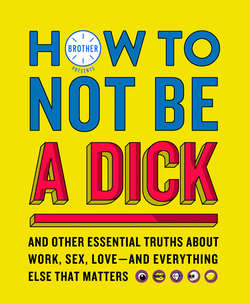Читать книгу How to Not Be a Dick: And Other Truths About Work, Sex, Love - And Everything Else That Matters - Brother - Страница 14
ОглавлениеA Brief Note on Hubris
Unless you are employed as a tightrope walker, life’s most difficult balancing act is toeing the line between self-confidence and arrogance. The former is essential for success; the latter is essential for being a prick.
They’re really not that different, to be honest—after all, both self-confidence and arrogance take root in the same soil: your sense of self. What matters is how you choose to fertilize that soil. The more manure you mix in, the greater the likelihood your self-confidence will grow unchecked, until it inevitably blossoms into extreme arrogance.
And that’s where hubris comes in. If you don’t have a dictionary handy (or don’t remember dictionaries), hubris is a personality quality marked by foolish pride or dangerous overconfidence, and it’s a direct byproduct of arrogance. In Greek mythology, it was also an affront to the Gods, one that often earned a swift rebuke—like Icarus, whose homemade wings melted when he flew too close to the sun; or Arachne, who challenged Athena to a weaving contest and got turned into a spider.
In 2018, hubris won’t get you turned into an insect, but it might still get you killed (especially if you’re a professional tightrope walker) and will unquestionably turn you into an asshole. If you think about every single person you dislike, there’s a pretty good chance the reason you dislike them is hubris—they are too aggressive, cocky, competitive, delusional, overbearing, insincere, underqualified, egotistical, vain, vindictive, shallow or petty to be around for any length of time. Social media is fueled almost entirely by hubris. So are Donald Trump and Vladimir Putin.
You might read that and think, “OK, but those are two of the most powerful men on the planet.” And you’d be correct—one is the president and the other is literally a James Bond villain. It does take a certain amount of hubris to ascend to humanity’s upper echelon. But it’s not an absolute requirement.
Look at Richard Branson. He has a net worth of $5 billion, and owns private islands and airlines and rocketships, yet are able to have a laugh at their own expense (Richard Branson is actually funny, too). That’s because he possesses a supreme level of self-confidence, founded in supreme self-awareness. In short, he doesn’t (or didn’t) believe the hype. That’s the key. Because if you know who you are, and are honest about your strengths and shortcomings, you are truly self-aware—and self-confident. Without that knowledge, hubris becomes second nature; you won’t know you’ve flown too close to the sun until your wings start melting.
So, yes, be confident—but be realistic. Otherwise, you’re just setting yourself up for a spectacular undoing. Because there are always going to be moments in life where you come up short. If you are humble, you will always learn something from your failures. If you are hubristic, the only thing you’ll learn is that a whole lot of people really delighted in your downfall. That’s called Schadenfreude . . . but we’ll discuss that in book #2. If you’ve been paying attention, yes, that statement counts as hubris, too.
